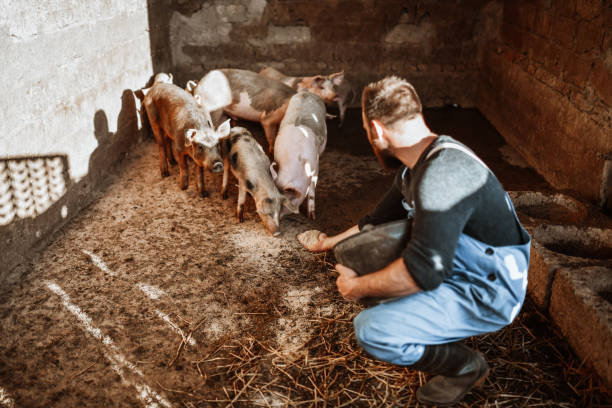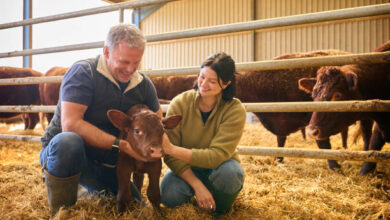
What Are Farm Animals? Everything You Need To Know
Farm animals play a crucial role in agriculture, providing food, labor, and economic stability. Understanding what farm animals are, their types, and their roles is essential for anyone involved in farming or interested in agriculture. In this comprehensive guide, we’ll explore the different types of farm animals, their importance, and how they contribute to our daily lives.
Types of Farm Animals
Farm animal can be categorized into several types, including livestock, poultry, and others. Each category includes various animals that serve specific purposes on the farm.
- Livestock:
- Cattle
- Pigs
- Goats
- Sheep
- Poultry:
- Chickens
- Ducks
- Turkeys
- Others:
- Horses
- Rabbits
Common Farm Animals and Their Roles
- Cattle
– Uses: Cattle are raised for dairy production, meat, and labor. Dairy cattle produce milk, which is used for drinking and making dairy products like cheese and butter. Beef cattle are bred for meat production, providing a significant source of protein.
– Breeds and Characteristics: Common breeds include Holstein (dairy) and Angus (beef). Holsteins are known for high milk production, while Angus cattle are prized for their quality meat.
- Pigs
– Uses: Pigs are primarily raised for meat production, including pork, bacon, and ham. They are also valued for their ability to convert feed into protein efficiently.
– Breeds and Characteristics: Popular breeds include Yorkshire and Duroc. Yorkshire pigs are known for their lean meat, while Durocs are recognized for their hardiness and good meat quality.
- Chickens
– Uses: Chickens are raised for egg production and meat. Laying hens produce eggs, while broiler chickens are bred for meat.
– Breeds and Characteristics: Common breeds include Leghorn (eggs) and Cornish (meat). Leghorns are prolific layers, while Cornish chickens grow quickly and have a broad, meaty body.
- Goats
– Uses: Goats are versatile animals raised for milk, meat, and fiber. Goat milk is used for drinking and making cheese, while goat meat is a staple in many cultures. Some breeds also produce mohair or cashmere.
– Breeds and Characteristics: Popular breeds include Nubian (milk) and Boer (meat). Nubians are known for high milk yield, while Boers are preferred for their fast growth and meat quality.
- Sheep
– Uses: Sheep are raised for wool, meat, and milk. Wool from sheep is used in textiles, while sheep meat (lamb or mutton) is consumed worldwide.
– Breeds and Characteristics: Common breeds include Merino (wool) and Suffolk (meat). Merinos are prized for their fine wool, while Suffolks are known for their meat production.
- Ducks
– Uses: Ducks are raised for eggs and meat. Duck eggs are larger than chicken eggs and have a rich flavor, while duck meat is popular in many cuisines.
– Breeds and Characteristics: Popular breeds include Pekin (meat) and Khaki Campbell (eggs). Pekins are known for their tender meat, while Khaki Campbells are prolific layers.
YOU MAY LOVE TO READ
Diseases of Farm Animals and How to Prevent Them
Fish Farming: A Comprehensive Guide.
What is Clip Farming? All You Need To Know
Importance of Farm Animals
Farm animals contribute significantly to food production, economic stability, and sustainable farming practices. They provide essential products such as milk, meat, eggs, and wool, which are integral to human diets and industries. Additionally, farm animal support rural economies and livelihoods, offering employment and income to many communities.
– Contribution to Food Production: Farm animals are a primary source of food, supplying dairy, meat, and eggs. These products are rich in essential nutrients, making them a critical part of human diets.
– Economic Importance in Agriculture: Livestock farming generates income for farmers and contributes to the agricultural economy. The sale of animal products supports local and global markets.
– Role in Sustainable Farming Practices: Farm animals play a role in sustainable agriculture by providing manure for fertilizing crops and helping maintain soil health. Integrated farming systems use animals to enhance productivity and sustainability.
– Benefits to Rural Communities: Raising farm animal supports rural communities by providing food security, employment, and economic stability. Animal husbandry also fosters community development and resilience.
Common Questions
- What are the different types of farm animals?
Farm animals are categorized into livestock (cattle, pigs, goats, sheep), poultry (chickens, ducks, turkeys), and other animals (horses, rabbits). Each type serves specific purposes, from providing food to offering labor.
- How do farm animals contribute to agriculture?
Farm animal contribute to agriculture by producing food (milk, meat, eggs), offering labor (plowing, transportation), and supporting sustainable farming practices (manure for fertilization). They also play a crucial role in the agricultural economy by generating income for farmers.
- What are the benefits of raising farm animals?
Raising farm animals offers numerous benefits, including food production, economic stability, and support for sustainable farming practices. Farm animal also provide employment and income to rural communities, enhancing food security and community resilience.
Conclusion
Understanding what farm animal is and their importance is essential for appreciating their role in agriculture and our daily lives. From providing food to supporting sustainable farming practices, farm animal are integral to the agricultural ecosystem. By learning about different farm animals and their roles, we can better appreciate their contributions and ensure their well-being.




